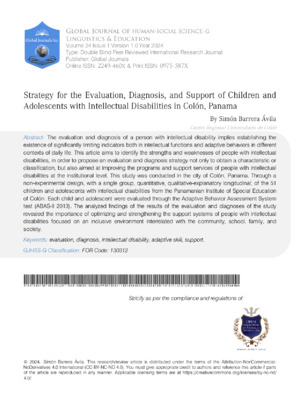Strategy for the Evaluation, Diagnosis, and Support of Children And Adolescents with Intellectual Disabilities in Colón, Panama
Keywords:
evaluation, diagnosis, intellectual disability, adaptive skill, support
Abstract
The evaluation and diagnosis of a person with intellectual disability implies establishing the existence of significantly limiting indicators both in intellectual functions and adaptive behaviors in different contexts of daily life This article aims to identify the strengths and weaknesses of people with intellectual disabilities in order to propose an evaluation and diagnosis strategy not only to obtain a characteristic or classification but also aimed at improving the programs and support services of people with intellectual disabilities at the institutional level This study was conducted in the city of Col n Panama Through a non-experimental design with a single group quantitative qualitative-explanatory longitudinal of the 51 children and adolescents with intellectual disabilities from the Panamanian Institute of Special Education of Col n Each child and adolescent were evaluated through the Adaptive Behavior Assessment System test ABAS-II 2013 The analyzed findings of the results of the evaluation and diagnoses of the study revealed the importance of optimizing and strengthening the support systems of people with intellectual disabilities focused on an inclusive environment interrelated with the community school family and society
Downloads
How to Cite
References

Published
2024-02-17
Issue
Section
License
Copyright (c) 2024 Authors and Global Journals Private Limited

This work is licensed under a Creative Commons Attribution 4.0 International License.